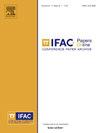Towards time adaptive observations for model order reduction in data assimilation
Q3 Engineering
引用次数: 0
Abstract
In this work, we focus on two aspects of 4D-var data assimilation (DA) governed by parabolic partial differential equations (PDEs). First, we are interested on how to set up adaptive time grids for DA problems and in what extend DA benefits from it. Second, we study the application of model order reduction (MOR) for DA problems. Since solving DA problems requires to solve the involved PDEs repeatedly, the use of MOR techniques is an obvious approach. We apply the methods Proper Orthogonal Decomposition (POD) and Dynamic Mode Decomposition (DMD) and investigate whether the previously introduced adaptive time grid facilitates the MOR with respect to accuracy and efficiency.
In order to construct an adaptive time grid, we interpret the DA problem in the context of optimal control and use a reformulation of the optimality conditions. Following Gong et al. (2012), we transferred their idea of deriving a-posteriori error estimates to the 4D-var problem in Graßle and Marquardt (2024). In this work, we extend our previous results where we derived an error estimate for the adjoint state by additionally considering an estimate for the state. The resulting time grid is used for MOR, which has already been done for distributed control problems in order to identify suitable snapshot locations, see Alla et al. (2016, 2018). We conclude with a numerical example.
数据同化中模型降阶的时间自适应观测
在这项工作中,我们重点研究了由抛物型偏微分方程(PDEs)控制的4D-var数据同化(DA)的两个方面。首先,我们感兴趣的是如何为数据分析问题建立自适应时间网格,以及数据分析从中受益的范围。其次,我们研究了模型阶数约简(MOR)在数据分析问题中的应用。由于解决数据处理问题需要反复解决所涉及的pde,因此使用MOR技术是一种显而易见的方法。本文应用固有正交分解(POD)和动态模态分解(DMD)方法,研究了之前引入的自适应时间网格在精度和效率方面是否有利于MOR。为了构建自适应时间网格,我们在最优控制的背景下解释数据处理问题,并使用最优性条件的重新表述。继Gong et al.(2012)之后,我们将他们推导后后误差估计的想法转移到Graßle和Marquardt(2024)的4D-var问题中。在这项工作中,我们扩展了之前的结果,通过额外考虑对状态的估计,我们得出了伴随状态的误差估计。得到的时间网格用于MOR,这已经用于分布式控制问题,以确定合适的快照位置,参见真主安拉等人(2016,2018)。最后给出了一个数值例子。
本文章由计算机程序翻译,如有差异,请以英文原文为准。
求助全文
约1分钟内获得全文
求助全文
来源期刊

IFAC-PapersOnLine
Engineering-Control and Systems Engineering
CiteScore
1.70
自引率
0.00%
发文量
1122
期刊介绍:
All papers from IFAC meetings are published, in partnership with Elsevier, the IFAC Publisher, in theIFAC-PapersOnLine proceedings series hosted at the ScienceDirect web service. This series includes papers previously published in the IFAC website.The main features of the IFAC-PapersOnLine series are: -Online archive including papers from IFAC Symposia, Congresses, Conferences, and most Workshops. -All papers accepted at the meeting are published in PDF format - searchable and citable. -All papers published on the web site can be cited using the IFAC PapersOnLine ISSN and the individual paper DOI (Digital Object Identifier). The site is Open Access in nature - no charge is made to individuals for reading or downloading. Copyright of all papers belongs to IFAC and must be referenced if derivative journal papers are produced from the conference papers. All papers published in IFAC-PapersOnLine have undergone a peer review selection process according to the IFAC rules.
 求助内容:
求助内容: 应助结果提醒方式:
应助结果提醒方式:


